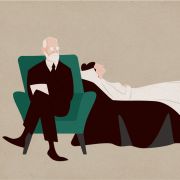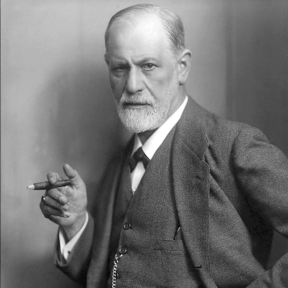
Freudian Psychology
Freudian psychology is based on the work of Austrian neurologist Sigmund Freud (1856-1939). He is considered the father of psychoanalysis and is largely credited with establishing the field of talk therapy. Today, psychoanalytic and psychodynamic approaches to therapy are the modalities that draw most heavily on Freudian principles. Freud also developed influential theories about subjects such as the unconscious mind, the sources of psychopathology, the significance of dreams.

Freud is known for his wide-ranging theories on matters such as the unconscious, dreams, infantile sexuality, libido, repression, and transference—all of which continue to influence the field of psychology to varying degrees. Trained as a neurologist, Freud conceived of the mind as the desire-centered id, the morally driven superego, and the ego (or "the I") in between, contributed to a new understanding of human psychological development and the treatment of psychological disturbance.
Other concepts that are popularly associated with Freud today include that of revealing "Freudian slips” in speech and Freud’s theory of the Oedipus complex, in which a child harbors an unconscious sexual attraction to an opposite-sex parent.
The unconscious part of the mind was described as a well of powerful thoughts and feelings that people are not directly aware of but which have an important impact on everyday life. He believed that this concealed mental material contributed to the development of mental illness.
Freud created a model of the mind featuring three parts: the id, ego, and superego. The id was the seat of primitive drives, including sexual and aggressive impulses. The ego included conscious processes as well as unconscious “defense mechanisms” erected to handle conflicts between the id and the demands of reality. The superego was considered the mental embodiment of society’s moral codes, which could result in self-blame and guilt.
Defense mechanisms were described by Freud as ways in which the mind adapts to internal conflicts. Examples include repression, or barring uncomfortable thoughts from consciousness; displacement, or shifting emotional responses (such as aggression) from an initial target to a safer one; and reaction formation, or behaving in a way that runs counter to one’s true feelings.
Freud argued that dreams were an important window into the unconscious mind and could be understood as the mind’s way of satisfying desires that could not be satisfied in waking life. Elements of reality could be represented by a variety of dream symbols. He proposed ways of deciphering their meaning in his 1899 book The Interpretation of Dreams.
A "Freudian slip" is an instance of misspeaking—"we've had a few sexbacks," or "nice to beat you"—that supposedly reveals hidden thoughts or motives. Freud described such slips in his 1901 book, The Psychopathology of Everyday Life.
Freud proposed that boys have sexual feelings for their mother and desire to eliminate their father. (Oedipus is a mythical figure who kills his father and marries his mother, not knowing they are his parents.) There is no consensus among psychologists that there is a universal Oedipus complex that takes the form Freud described.
Penis envy, involving a supposed sense of inadequacy in girls due to their lack of male genitalia, was, like the Oedipus complex, one of Freud’s more controversial ideas. It is doubtful that penis envy is a typical developmental phenomenon.
Freud theorized that during development, people passed through five psychosexual stages: oral, anal, phallic, latency, and genital. They were largely named for erogenous zones that he thought to be central at each stage—during breastfeeding (oral), during toilet training (anal), and so on, with the Oedipus complex thought to take place during the phallic stage, around the fourth to sixth years.
Freud described the libido as the mental energy of the human instincts to live and procreate. It was thought to express itself through physical means (including sexual gratification), but also through psychological means, as in the form of wish fulfillment in dreams.

The form of therapy that Freud pioneered, called psychoanalysis, has played a foundational role in the practice of therapy in general. As a theorist and a clinician, he illustrated the potential power of talking and making observations about one’s inner life in improving symptoms of mental illness. While later branches of psychotherapy—including contemporary psychoanalysis—differ from him on the details of theory and practice, they have nevertheless been influenced by Freud's work.
Freudian psychoanalysis is both a method of treatment and a way of understanding the mind, based on Freud’s ideas. In his version of treatment, mental illness is thought to be largely rooted in the unconscious, and the psychoanalyst plays a part in bringing pathological mental processes into consciousness.
One of Freud’s major tools was free association, in which a patient talks freely about any thoughts that come to mind, thought to be a way to bring internal conflicts into awareness and address them. The relationship between therapist and patient was also considered key, and transference—projecting one's feelings about another person (such as a parent) onto the therapist—presented an opportunity to deal with those feelings.
In psychoanalysis, having the patient lie on a couch during sessions—not looking directly at the therapist—is thought to make it easier for the patient to open up about inner thoughts during the process of free association. It might also facilitate the therapist’s thinking during sessions.
Having conducted his own self-analysis, Freud trained new psychoanalysts in part by analyzing them. Subsequently, psychoanalysts-in-training were analyzed by someone who had themselves been analyzed, in a chain leading back to Freud. This has been called a “training analysis.”
There are still practicing psychoanalysts, though psychoanalysis has evolved beyond Freud’s original ideas. A related and broader category of therapy is psychodynamic therapy.

As psychology and psychotherapy evolved, the approach to therapy that Freud created slipped from prominence. Major ideas of his, such as his conceptualization of the unconscious, have been discounted by scientists as difficult or impossible to test empirically.
Nevertheless, psychologists continue to find wisdom and meaning in Freudian concepts, such as projection and other "defense mechanisms," and modern psychoanalytic therapists owe much to Freud’s methods, as do therapists who employ psychodynamic approaches.
Freud’s concepts persist in the popular imagination and his work forms an important part of the history of psychology. Though many of his ideas have been reevaluated or rejected, others provided a basis for further psychological theory and modes of treatment.
While Freud drew on his own self-analysis, clinical cases, and other sources to develop his theories, they generally were not subject to empirical testing in the way that contemporary psychological theories are expected to be. Modern scientific evidence indicates the Freud overemphasized the role of early childhood experiences in the development of mental illness.
Yes, many of them are. Psychologists acknowledge the significance of mental processes of which individuals are unaware (or only partly aware). Defense mechanisms—or similar thought patterns—are still targeted by some forms of contemporary therapy. And the therapist-patient bond, while it may not take the same shape as in traditional psychoanalysis, is known to be a keystone of effective psychotherapy.














